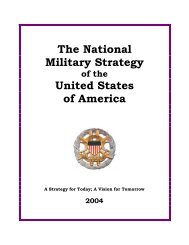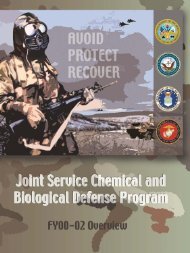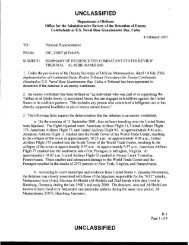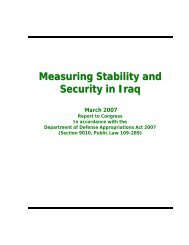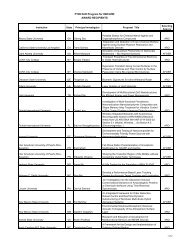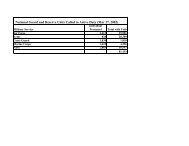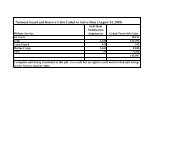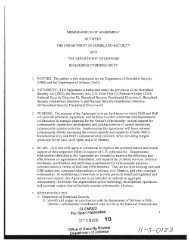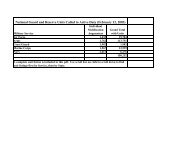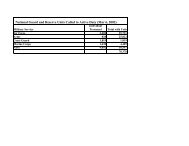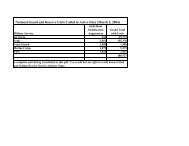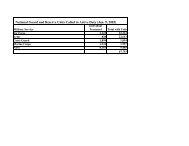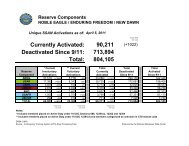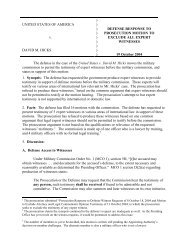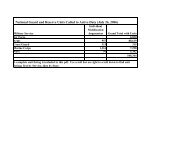Report - United States Department of Defense
Report - United States Department of Defense
Report - United States Department of Defense
Create successful ePaper yourself
Turn your PDF publications into a flip-book with our unique Google optimized e-Paper software.
UNCLASSIFIED<br />
prevent well-intentioned, reform-minded <strong>of</strong>ficers from reporting on or disrupting the criminal<br />
activity perpetrated by their network.<br />
ANP Corruption: The ANP faces major challenges from corruption. There is continued<br />
reporting <strong>of</strong> individual Provincial and District Chiefs <strong>of</strong> Police (PCoPs and DCoPs) engaging in<br />
illicit activities, accepting/soliciting bribes, abusing civilians, and cooperating with the<br />
insurgency and narcotics traffickers. At a strategic level, there is sustained political interference<br />
with investigations and with the ANP freely exercising their constitutional role in enforcing the<br />
law. Agencies such as the MoI Major Crimes Task Force (MCTF) have been blocked when they<br />
have attempted to detect and investigate corruption.<br />
ABP Corruption: The ABP are particularly vulnerable to criminal influence and capture<br />
because <strong>of</strong> the lucrative financial opportunities involved in cross-border smuggling, especially in<br />
narcotics, as well as from the collection <strong>of</strong> illegal taxes and the theft <strong>of</strong> state customs revenues at<br />
border crossing points and airports. <strong>Report</strong>ing <strong>of</strong> large payments for the purchase <strong>of</strong> ABP<br />
positions suggests how lucrative these positions can be. Indeed, most (if not all) ABP <strong>of</strong>ficers<br />
have to buy their positions and then reimburse their initial bribe cost by accepting bribes at the<br />
border. Powerful, region-based CPNs and insurgents have sought to control revenue streams at<br />
Afghanistan’s borders, and co-opting or controlling ABP units is key to generating illegal pr<strong>of</strong>its.<br />
Political pressure by CPNs with politically strong power-brokers has an overbearing influence<br />
over ABP corruption.<br />
However, substantial progress was made this reporting period in preventing opportunities for<br />
criminal interference in the security sector, including improvements across the MoD and MoI.<br />
There have been several fuel system assessments completed during this period in the MoI and<br />
MoD, with a continuing robust schedule <strong>of</strong> assessments and inspections being performed by the<br />
Afghan Inspector General teams and oversight by the coalition team. Although the MoI<br />
Transparency and Accountability Committee (TAC) has yet to have significant success removing<br />
corrupt actors, the systems are in place, and ISAF is closely monitoring these new corruption<br />
oversight institutions. Beyond three initial convictions in the National Military Hospital (NMH)<br />
case, investigations/prosecutions have progressed slowly, but the Afghan investigation team has<br />
made some progress. The Attorney Generals Office remains largely a proxy for an agenda <strong>of</strong><br />
patronage and influence.<br />
MoD personnel, logistics, acquisition/procurement, finance, and legal departments continue to<br />
make some progress on 50 <strong>of</strong> the 54 anti-corruption commitments made as part <strong>of</strong> the Office <strong>of</strong><br />
the National Security Council (ONSC) Transparency and Accountability Working Group<br />
(TAWG) process. However, the ONSC TAWG, and the Senior High Commission on Anti-<br />
Corruption (SHCAC) do not regularly meet to track progress or receive status updates, and<br />
evidence <strong>of</strong> actual progress is minimal. The MoD <strong>of</strong>fice, tasked to implement anti-corruption<br />
systems and increase transparency and accountability within the MoD, has started to show some<br />
tangible results in tackling corruption issues in a few specific areas, although it now needs to<br />
coordinate its actions with the MoD GS to increase its effectiveness across all departments.<br />
The MoI phase <strong>of</strong> the ONSC TAWG completed the establishment <strong>of</strong> the initial anti-corruption<br />
commissions in all seven police zones, and in eleven provinces and seven districts. The zone<br />
123



